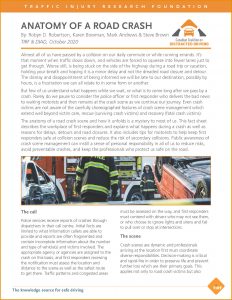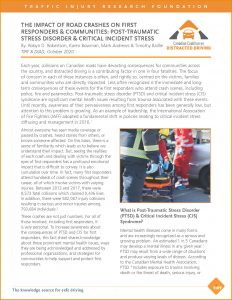
Each year, collisions on Canadian roads have devastating consequences for communities across the country, and distracted driving is a contributing factor in one in four fatalities. Concern understandably centres on the victims, families and communities who are directly impacted. But the immediate and long-term consequences for first responders, including police, fire and paramedics, who attend crash scenes is not always recognized.
“Police services and first responders are committed to protecting the lives and safety of everyone on the roads, regardless of circumstances. These professionals willingly place themselves in harm’s way to enforce traffic laws and mitigate loss of life when crashes occur,” says Robyn Robertson, President & CEO, TIRF. “First responders attend far too many crash scenes throughout their career and carry with them the tragic outcomes every day. Their contribution to the CCDD National Action Plan on distracted driving was vital to prevent other Canadian families from experiencing such losses.”
Between 2013 and 2017, there were 8,573 fatal collisions which claimed 9,436 lives and 582,067 injury collisions resulting in serious and minor injuries among 793,684 individuals. These crashes are not just numbers. For all of those involved, including first responders, it is very personal.

Results from a 2017 national study from the Canadian Institutes of Health Research (CIHR), raised alarm about the risks to the mental wellbeing of Canadian public safety personnel such as police officers, firefighters, dispatchers and correctional officers. It examined the connection between the exposure of first responders to potentially traumatic events during their duties and the increased likelihood of developing a mental disorder compared to the general population.
“Distracted driving is a contributing factor in motor vehicle incidents which are a factor in significant critical incident stress for firefighters,” says Capt. Tim Baillie (ret.), Surrey Fire Service and DIAD co-speaker. “I have seen firsthand the horrible results of first responder critical incident stress and believe knowledge and training will help us who help others.”
Crash scenes are a first responder’s place of work and we need to support them in performing their duties. Their efforts not only help prevent the future loss of life, but also provide victims with the care they need and families with the answers to help them move forward.
“Through the CCDD The Co-operators has been actively convening and collaborating with like-minded organizations across industry sectors to help influence changes and public perceptions of important issues such as Distracted Driving,” explains Lisa Guglietti, COO, The Co-operators. “Our ultimate goal is to create awareness and change dangerous driving behaviours to keep our communities, and thus our first responders, safe.”
These fact sheets are intended to raise awareness about the toll preventable collisions have on first responders, as well as victims and communities, and to share insider knowledge of crash scene management with the public to help keep first responders safe while on the job. Driving is both a responsibility and a privilege and with that, individuals hold the power to reduce their risk. Everyone has the right to get home safe every day; not just physically, but also emotionally.

Download fact sheets and ‘The Road’ by Kylee Bowman:
- Anatomy of a Road Crash
- The Impact of Road Crashes on First Responders & Communities: Post-Traumatic Stress Disorder & Critical Incident Stress
- Available soon – Fact sheets in French on the CCDD e-hub
- ‘The Road’ – © Kylee Bowman 2020 original artwork
About the Traffic Injury Research Foundation:
The mission of the Traffic Injury Research Foundation (TIRF) is to reduce traffic-related deaths and injuries. TIRF is an independent, charitable road safety research institute. Since its inception in 1964, TIRF has become internationally recognized for its accomplishments in identifying the causes of road crashes and developing programs and policies to address them effectively.
About The Co-operators:
The Co-operators Group Limited is a Canadian co-operative with more than $51.4 billion in assets under administration. Through its group of companies, it offers home, auto, life, group, travel, commercial and farm insurance, as well as investment products. The Co-operators is well known for its community involvement and its commitment to sustainability. The Co-operators is ranked as a Corporate Knights’ Best 50 Corporate Citizen in Canada and listed among the Best Employers in Canada by Kincentric (formerly AON). For more information, visit www.cooperators.ca.
– 30 –
For more information, please contact:
Karen Bowman
Director, Marketing and Communications
Traffic Injury Research Foundation
613-238-5235 (office)
1-877-238-5235 (toll-free)
250-797-0833 (direct)
613-238-5292 (fax)
tirf@tirf.ca / karenb@tirf.ca
The Co-operators
media@cooperators.ca
